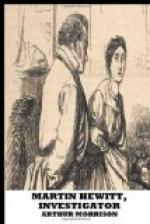“Well, yes; I haven’t been far off. I guessed you’d want to clear out of town if Hollams was taken, and I knew this”—Hewitt tapped his breast pocket—“was what you’d take care to get hold of first. You hid it, of course, because you knew that Hollams would probably have you searched for it if he got suspicious?”
“Yes, he did, too. Two blokes went over my pockets one night, and somebody got into my room. But I expected that, Hollams is such a greedy pig. Once he’s got you under his thumb he don’t give you half your makings, and, if you kick, he’ll have you smugged. So that I wasn’t going to give him that if I could help it. I s’pose it ain’t any good asking how you got put on to our mob?”
“No,” said Hewitt, “it isn’t.”
* * * * *
We didn’t get back till the next day, staying for the night, despite an inconvenient want of requisites, at the Hall. There were, in fact, no late trains. We told Sir Valentine the story of the Irishman, much to his amusement.
“Leamy’s tale sounded unlikely, of course,” Hewitt said, “but it was noticeable that every one of his misfortunes pointed in the same direction—that certain persons were tremendously anxious to get at something they supposed he had. When he spoke of his adventure with the bag, I at once remembered Wilks’ arrest and subsequent release. It was a curious coincidence, to say the least, that this should happen at the very station to which the proceeds of this robbery must come, if they came to London at all, and on the day following the robbery itself. Kedderby is one of the few stations on this line where no trains would stop after the time of the robbery, so that the thief would have to wait till the next day to get back. Leamy’s recognition of Wilks’ portrait made me feel pretty certain. Plainly, he had carried stolen property; the poor, innocent fellow’s conversation with Hollams showed that, as, in fact, did the sum, five pounds, paid to him by way of ‘regulars,’ or customary toll, from the plunder of services of carriage. Hollams obviously took Leamy for a criminal friend of Wilks’, because of his use of the thieves’ expressions ‘sparks’ and ‘regulars,’ and suggested, in terms which Leamy misunderstood, that he should sell any plunder he might obtain to himself, Hollams. Altogether it would have been very curious if the plunder were not that from Radcot Hall, especially as no other robbery had been reported at the time.
“Now, among the jewels taken, only one was of a very pre-eminent value—the famous ruby. It was scarcely likely that Hollams would go to so much trouble and risk, attempting to drug, injuring, waylaying, and burgling the rooms of the unfortunate Leamy, for a jewel of small value—for any jewel, in fact, but the ruby. So that I felt a pretty strong presumption, at all events, that it was the ruby Hollams was after. Leamy had not had it, I was convinced, from his tale and his manner,




